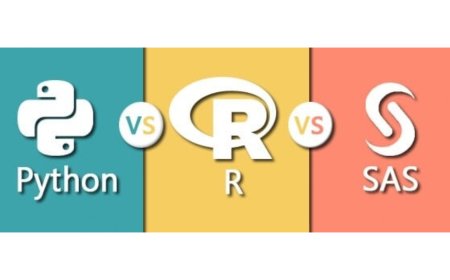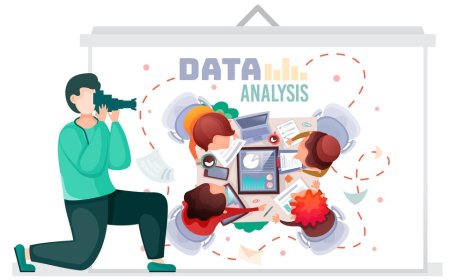Data Science Career Path guide
Explore the Data Science career path with our comprehensive guide. Learn how to become a data scientist, gain essential skills, and discover job opportunities

Technology is constantly evolving. and data science has become increasingly important. As a result, there is a high demand for skilled data scientists, making it a desirable career path. However, navigating this complex field requires careful consideration of various educational and professional options. This guide is designed to help aspiring data scientists by providing valuable insights and practical advice to help them succeed in their careers. With a focus on clarity and informed decision-making, it empowers individuals to start on a successful journey in the ever-evolving and impactful domain of data science.
To succeed in the constant advancement of data science, it's important to approach it with careful consideration and a strategic mindset. With the growing demand for data scientists, there are now more opportunities and paths to choose from than ever before. From traditional university programs to online certifications and immersive boot camps, there are a variety of educational options available, each with its own unique benefits. However, it's not just about education - practical experience and ongoing skill development are also key factors in building a successful career in data science. This guide is designed to help demystify the journey and provide valuable insights and tips to help individuals make informed decisions and gain a deeper understanding of the exciting and data science is a multifaceted field.
Diverse Learning Paths:
The multitude of learning options, including university programs, boot camps, and online certifications, can be overwhelming. Each path offers distinct advantages and challenges, requiring individuals to carefully assess their learning preferences, time commitments, and career goals.
Evolving Skill Set:
The field of data science is dynamic, with evolving technologies and tools. Understanding the essential skills, from programming languages to machine learning algorithms, poses a constant challenge. Aspiring data scientists must stay abreast of industry trends to remain relevant.
Job Market Dynamics:
The competitive nature of the job market introduces complexities in securing a data science role. Crafting a compelling resume, building a strong portfolio, and effectively showcasing one's skills become critical components in landing coveted positions.
How can aspiring data scientists navigate the diverse learning paths?
1. Navigating Learning Paths:
University Programs:
- Holistic Understanding: University programs provide a comprehensive and holistic understanding of data science, covering a wide range of topics, from statistical analysis and machine learning to data visualization.
- Research Opportunities: The academic environment fosters research collaborations, offering students the chance to engage in cutting-edge projects, and contributing to the broader academic community.
- Networking: Being part of a university community facilitates networking with professors, industry professionals, and fellow students. This network can prove invaluable in securing internships and job opportunities.
Bootcamps:
- Intensive and Practical: Bootcamps are designed to be intensive and practical, focusing on hands-on experience. This approach allows for a rapid acquisition of skills within a condensed timeframe.
- Industry-Relevant Skills: Many boot camps collaborate closely with industry partners to ensure their curriculum is aligned with current industry needs. Graduates often possess skills immediately applicable in practical scenarios.
- Networking Opportunities: Bootcamps frequently organize networking events, providing opportunities for students to connect with industry professionals. Some even offer career services to assist with job placement
Online Certifications:
- Flexibility: Online certification programs offer flexibility, allowing individuals to learn at their own pace and schedule. This is particularly advantageous for those with other commitments such as work or family responsibilities.
- Cost-Effective: Generally more affordable than university programs, making them accessible to a broader audience. Online learners can often save on commuting and housing costs.
- Specialized Focus: Some certification programs focus on specific tools or technologies, enabling individuals to tailor their learning to their specific career goals.
2. Evolving Skill Set:
Technical Skills:
- Programming Languages: Proficiency in languages such as Python and R is fundamental for data scientists. These languages are widely used for tasks ranging from data cleaning to advanced machine learning.
- Machine Learning: Understanding machine learning algorithms, model building, and evaluation is crucial. Staying updated on the latest advancements ensures relevance in a rapidly evolving field.
- Data Manipulation: Skills in data cleaning, preprocessing, and analysis are indispensable. Proficiency in tools like Pandas and NumPy is valuable for effective data manipulation.
Soft Skills:
- Communication: The ability to convey complex findings to non-technical stakeholders is vital. Clear communication facilitates collaboration and ensures that data-driven insights are effectively communicated throughout an organization.
- Problem-Solving: Critical thinking and the ability to address practical challenges are key attributes of successful data scientists. The capacity to approach problems methodically and derive meaningful solutions is highly valued.
3. Navigating the Job Market:
Resume Building:
- Tailor for Relevance: Customizing resumes for each application is crucial. Highlighting relevant skills and experiences tailored to the specific job requirements increases the chances of grabbing the recruiter's attention.
- Showcase Projects: Including a portfolio that showcases practical projects and their impact provides tangible evidence of skills and accomplishments. Projects that solve practical problems demonstrate the ability to apply theoretical knowledge.
Networking:
- Utilize Online Platforms: Taking advantage of platforms like LinkedIn can expand professional networks. Actively participating in data science groups and forums allows for engagement with the broader data science community.
- Engage in Communities: Joining data science communities, both online and offline, provides opportunities to learn from peers, share experiences, and stay informed about industry trends.
Interview Preparation:
- Practice Problem-Solving: Engaging in mock interviews and practicing solving data science problems helps build confidence and sharpens problem-solving skills. Platforms like Kaggle offer a wealth of practical datasets for practice.
- Stay Updated: Being aware of current industry trends and challenges is essential for interview success. Interviewers often assess a candidate's knowledge of the latest tools and methodologies.
Data science is most important in today's technology-driven environment due to several reasons. To begin with, it is highly sought after in various industries as businesses increasingly rely on insights derived from data. Skilled data scientists are consistently in demand. Moreover, these professionals play a crucial role in decision-making by extracting valuable patterns from data, enabling organizations to make well-informed choices and drive innovation. Additionally, a career in data science equips individuals with a versatile skill set that encompasses programming, statistics, machine learning, and data visualization, which are essential for tackling complex challenges. Lastly, the ever-evolving nature of data science ensures continuous learning, exposing professionals to new technologies and fostering a culture of innovation, thus keeping them at the forefront of the field. In conclusion, data science is indispensable for meeting industry needs, facilitating decision-making, providing versatile skills, and promoting continuous learning and innovation.
Effective Tips:
1. Choose the Right Learning Path:
Assess your learning preferences and career goals before choosing between university programs, boot camps, or online certifications. The right learning path sets the foundation for your data science journey.
2. Continuous Skill Development:
Stay updated on industry trends by regularly engaging with relevant literature, blogs, and forums. Enroll in courses and workshops to continuously develop and enhance your technical skills.
3. Build a Strong Portfolio:
Showcase your skills through a diverse and well-documented portfolio. Highlight projects that demonstrate your ability to solve practical problems and effectively communicate findings.
4. Networking is Key:
Actively participate in industry events, both physical and virtual. Join data science communities, connect with professionals on platforms like LinkedIn, and seek mentorship to expand your network.
5. Effective Resume Tailoring:
Tailor your resume and cover letter for each application. Emphasize relevant skills and experiences that align with the specific job requirements. A customized application stands out in a competitive job market.
6. Soft Skills Matter:
Develop and showcase soft skills like communication, teamwork, and problem-solving. Data scientists often work in interdisciplinary teams, and effective collaboration is highly valued.
7. Participate in Competitions:
Engage in data science competitions and hackathons. Participation not only hones your problem-solving skills but also provides exposure and recognition within the data science community.
8. Strategic Interview Preparation:
Practice solving data science problems and be ready to articulate your thought process during interviews. Stay updated on industry trends and challenges to impress potential employers.
9. Seek Feedback and Learn from Rejections:
Accept feedback, especially after interviews or project reviews. Use rejections as learning opportunities, continuously refining your skills and strategies for future opportunities.
10. Stay Adaptable:
The data science field is dynamic, with evolving technologies. Stay adaptable and be open to learning new tools and methodologies to remain relevant in an environment that is constantly changing.
When starting a career in data science, it is important to consider the various options available for learning and skill development. While university programs provide a solid foundation, boot camps offer a more practical approach in a shorter time frame, and online certifications provide flexibility. It is crucial to continuously evolve and update both technical and soft skills to stay relevant in this rapidly changing field.
To succeed in the job market, it is not enough to simply have a well-crafted resume. Active networking and thorough interview preparation are also essential. The path to success in data science is multifaceted, requiring a combination of education, skill acquisition, and strategic career planning. By understanding the nuances of different learning paths, embracing lifelong learning, and strategically positioning themselves in the job market, aspiring data scientists can get started on a rewarding and successful career journey in this dynamic and ever-expanding field.





































